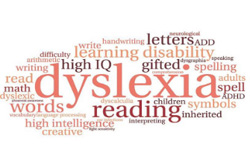
Pursuing Special Education When Your Child Has Dyslexia
Dyslexia is a specific learning disability that is recognized within the Individuals with Disabilities Education Act (IDEA). Dyslexia is neurobiological in origin and impacts reading and spelling. Dyslexia if characterized by difficulties with accurate and/or fluent word recognition and by poor spelling and decoding abilities. It results from deficits in phonological processing (a persistent difficulty in the awareness of and ability to manipulate individual sounds of spoken language). Some traits associated with dyslexia are trouble spelling, reading, and difficulties matching letters to sounds or the various sounds contained within words, and difficulties with reading comprehension.
Students with dyslexia may face challenges outside of the classroom as well. The struggles associated with dyslexia can affect students’ interest in reading. They may avoid reading aloud or to themselves or become frustrated while reading. They may also struggle socially and with self-esteem. If not identified, psychological impacts may occur during a student’s development which may lead to heightened anxiety, depression, anger, and emotional changes.
Despite these deficits, students with dyslexia have many strengths including reasoning, critical thinking, concept formation, problem solving, vocabulary, listening comprehension and social communication. Often students with dyslexia may be creative problem-solvers, imaginative, extra empathetic, or more visual or auditory thinkers.
How is Dyslexia Diagnosed?
Unfortunately, not all students with dyslexia are identified at early ages, due to environmental factors or perceived intelligence or effort in school. Early identification is critical to the success of your child’s education. If you suspect a student at any age may have dyslexia, diagnosing or identifying it can be done through a full evaluation at school or privately. School psychologists, clinical psychologists, and neuropsychologists can all evaluate a student for learning disabilities through a series of tests measuring different skills related to literacy.
Does Dyslexia Qualify for Special Education?
If student is diagnosed with dyslexia, he or she should qualify for special education services under IDEA, which entitles students with covered disabilities to a free appropriate public education. Dyslexia is one of the covered disabilities under IDEA because it falls under the “specific learning disability” category.
Special education for a student who has dyslexia is entitled to an Individualized Education Plan (IEP).
Other common special learning disabilities include:
- Dyscalculia (math disorder)
- Dysgraphia (writing disorder)
- Dyspraxia (motor skill disabilities)
- Aphasia/dysphasia (language disabilities)
- Auditory Processing Disorder
- Visual Processing Disorder
- Other Emotional or Development Delays
How Can a Special Education Attorney Experienced With Dyslexia Help?
Students with dyslexia can be highly successful with the right educational supports and structured literacy program. A special education attorney may be able to help ensure full access to learning and academic success. Special education attorneys are valuable advocates when working with the school district or administrators.
A special education attorney can help with ensuring a student with dyslexia receives independent educational evaluations, creating an IEP, attending team meetings, or issues surrounding a denial of accommodations or services due to dyslexia, as well as file for due process.
How Forte Law Group Can Help
Forte Law Group has experience helping families that have a child with dyslexia, including:
- Answering your questions about your legal rights as a parent and your child’s right to receive a free appropriate public education.
- Negotiating an appropriate educational placement for your child’s special education needs within a public school district program or within a therapeutic private outplacement-based school, at public school district expense.
- Representing the educational interests for you and your child at IEP and/or 504 meetings to ensure your child is receiving an ambitiously appropriate education uniquely designed to meet all your child’s needs.
- Advocating and obtaining special accommodations and modifications for your child’s schooling, including the right to additional evaluations.
- Pursing legal action by way of mediation and/or due process if the district fails to offer your child an appropriate education.
About Forte Law Group
At Forte Law Group, we represent families that have a child with a disability. We pride ourselves with working with school teams to help arrive at positive solutions to ameliorate the problem for the benefit of your child or where necessary bringing action against the school district.
If your child has dyslexia and you do not feel your child is receiving an appropriate education, contact our office today to speak with a Connecticut special education attorney today. Together, we can identify the best possible solution for your child so that your child receives the education he or she deserves.


